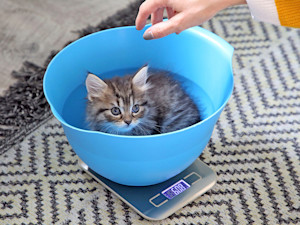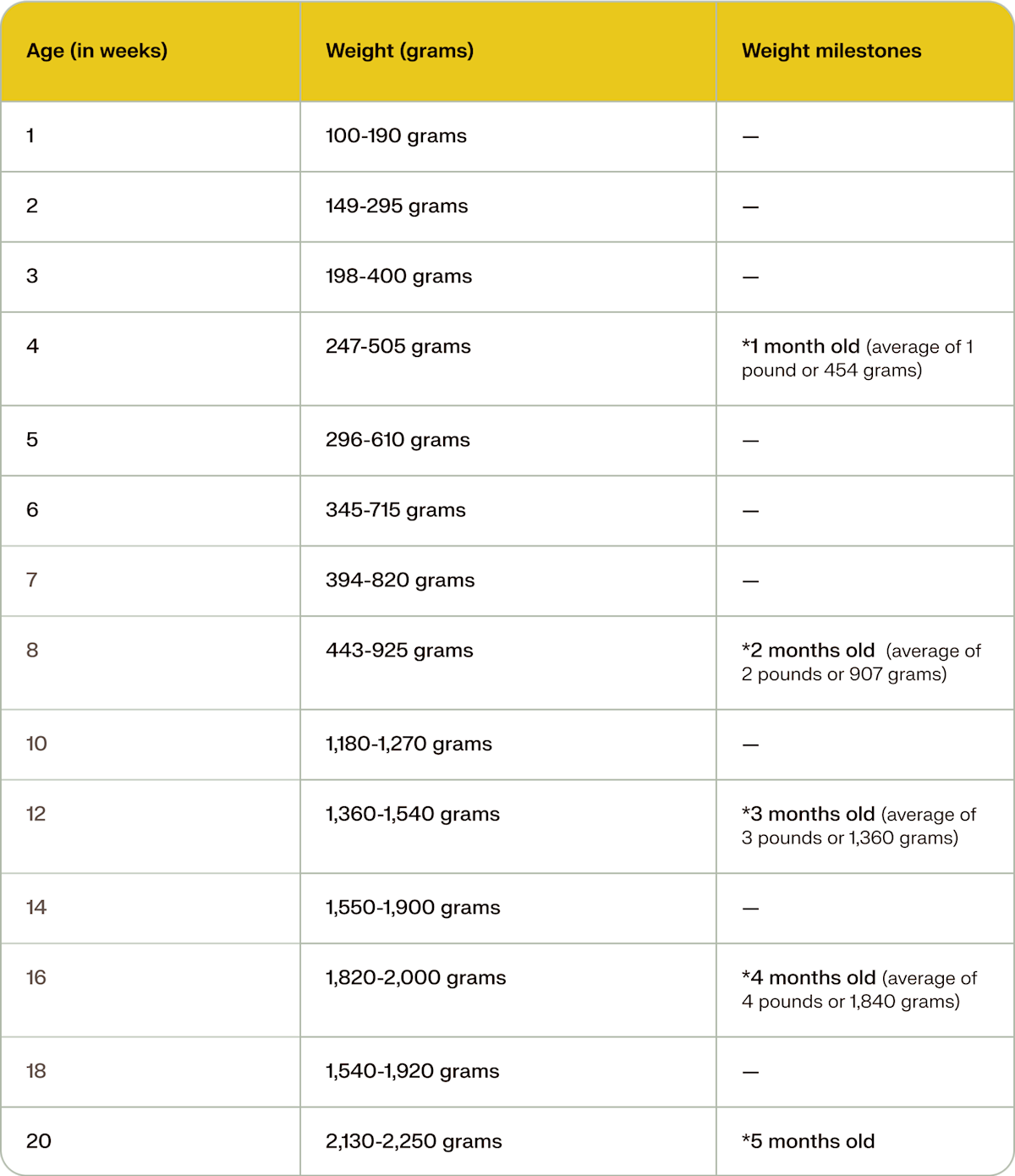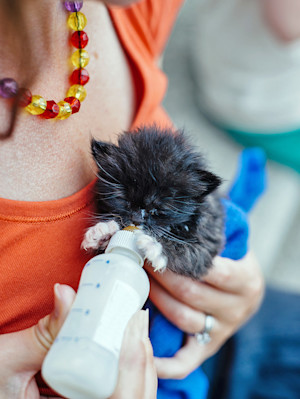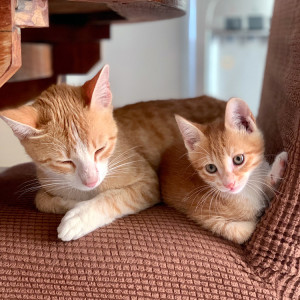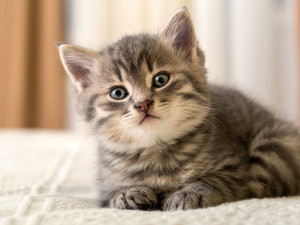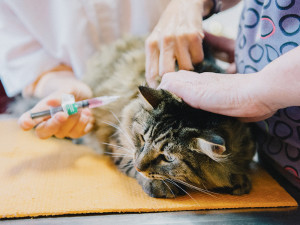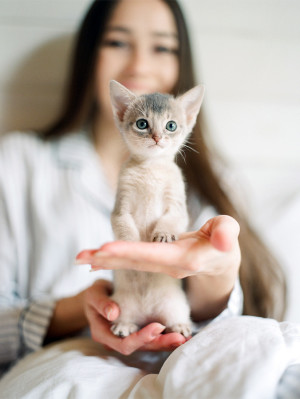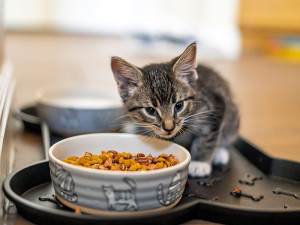Kitten Weight Chart: Track Your Kitten’s Growth
See how they should be progressing.
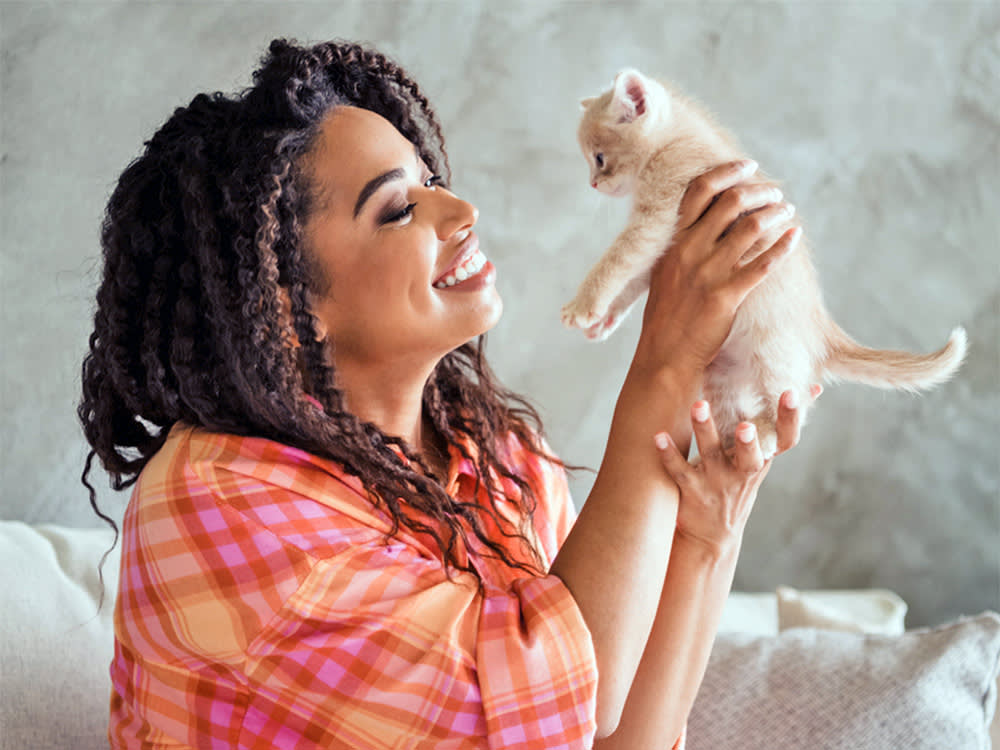
Share Article
In This Article:
Kitten Weight Charts Kitten Weight Milestones Assessing Your Kitten’s Weight Factors Affecting Healthy Kitten Weight Frequently Asked Questions
Healthy kittens grow rapidly in the first few weeks of life and continue to gain weight consistently each day. It is a good idea to keep track of your kitten’s weight over time to track their growth. While individuals will vary, a helpful guideline to keep in mind is that most healthy kittens should weigh about one pound per month of age, up to around four months old.
Kittens grow so fast in their first few weeks of life that it can be hard to remember how small they were just a week or two earlier. Consistent weight gain is a very useful measure of your kitten’s overall health and wellness. Tracking your kitten’s weight can be a very simple and useful way to keep tabs on their health and make adorable memories.
Kitten weight charts
If you scour the internet, you will likely find many charts and tables that show predicted weight gain for kittens over time. This is because young kittens tend to have very linear weight gain, making it a reliable way to track their growth. Keep in mind that most of the time, you will not know your kitten’s precise age to the day unless someone witnessed their birth.
In most cases, their age is an estimate based on their size and other developmental milestones. These age estimates may be off by a week or more, depending on who is doing the estimating and how closely your kitten’s growth follows the expected charts. Therefore, try not to get too hung up on the specific weights listed for a given age. These charts are most helpful as a general guide. The best way to monitor your kitten’s growth will be to weigh them daily, or at least every few days, and to start looking at their trends. As a guide, this chart provides average weight ranges for the first five months of kittenhood:

Kitten weight milestones
Due to the fact that kittens tend to have predictable, linear growth over time, their weight can be a useful way to mark important milestones and keep tabs on their health. Kittens that are not consistently gaining weight should be seen by a vet as they may have underlying health issues that are preventing them from growing.
These kittens may need specific medications or special diets as well as additional TLC to get back to optimum health. Once they do, they tend to make up for lost time and catch up in their growth and weight gain. The best way to accurately weigh small kittens is using a gram scale meant to weigh lighter objects. It is important to weigh your kitten at the same time of day for consistency. Here are some of the important weight milestones to keep in mind:
Healthy newborn kitten weight
Newborn kittens weigh an average of 100 grams at birth, with a healthy birth weight typically between 75-115 grams. Any kittens that weigh less than 75 grams at birth are more at risk for complications and should be monitored closely. In the first five weeks of life, kittens may gain between seven to 15 grams of body weight per day. Different studies have documented different daily weight gains, so what’s most important is that your kitten is gaining weight each day within this range.
Look at their overall weight trends over multiple days to weeks. Sometimes, you may not measure a significant gain from one day to the next, and this may be due to a number of variables, including the accuracy of your scale and whether your kitten actually stays still. Their daily weight fluctuations can also be influenced by when they last ate, peed, and/or pooped. When you are looking for changes of just a few grams per day, all of these factors can influence the numbers, so don’t panic if there is not much change in one 24-hour period. If your kitten is gaining weight consistently as the days go by, and they seem to be eating well, you are right on track. It’s time to see your vet when kittens are not gaining weight over multiple days, are losing weight, and/or not eating consistently.
Weight progression up to adulthood
After week five, kittens tend to gain weight more rapidly, with gains of up to 20 grams per day from week five to week 16. Again, keep in mind that it is more important to focus on your individual kitten’s growth chart than to worry about exactly how much they gain per day. As long as they are consistently gaining weight and meeting their milestones, their growth is on track. Some easy kitten math to keep in mind is that kittens typically gain about one pound per month for the first four months of life.
This means a one-month old kitten should weigh about one pound, and a four-month old weighs about four pounds. Once they are over four months old, their growth can vary a lot more, so the pound per month guidelines don’t really work. Their growth tends to slow down between six to eight months old, and kittens will keep growing until they are about one year old.
Some large-breed cats may continue to grow until they are closer to 18 months old. Once cats reach their adult size at around 12 months of age, their metabolism shifts and they no longer have the same caloric needs since they are not rapidly growing. It’s important to keep this in mind in order to adjust their diet and feeding schedule to optimize their adult health needs and prevent overfeeding.
Breed-specific weight considerations
If you have a pure-bred cat, especially a large-breed such as a Maine Coon, Norwegian Forest Cat, Ragdoll, or Bengal, you may be wondering how much your kitten should weigh. While these breeds are likely to outpace the average Domestic Shorthair in their growth milestones, the general trends hold true. Even large breed kittens should have consistent growth so if you are tracking your kitten’s weight over time, you can monitor for consistent gains or catch any signs of concern early.
If you adopted your kitten directly from a breeder, you will have the advantage of likely knowing your kitten’s exact age to the day, and this can help you plot their growth, too. You will also likely have the advantage of knowing your kitten’s biological parents and how large they are at their adult sizes, which can help you predict how large your kitten will be. Even if you do not have the benefit of all of this background information, your growth chart will be the most helpful tool for monitoring your kitten’s growth and getting a sense of their overall health. If they are not consistently gaining weight, it is important to dig deeper into what may be going on.
Assessing your kitten’s weight
Most healthy kittens are ravenous eaters, and it can feel like no matter how much you feed them, they are always screaming for more food. On the other hand, if you have a kitten that seems to be eating inconsistently or multiple kittens eating together, it may be difficult to tell if they are getting enough. All of this may have you wondering how to assess whether or not your kitten is at a healthy weight. Some points to consider are:
How do I know if my kitten is underweight?
First and foremost, if you have concerns that your kitten is underweight, it’s very important to have them examined by a vet. Young kittens are especially vulnerable to complications if they are not eating enough since they do not have the reserves of an adult cat. They can quickly develop problems like dehydration and/or low blood sugar.
Most veterinarians use a body-condition scoreopens in new tab to assess a cat’s overall weight and body condition along with other forms of evaluation. This is based on physical exam findings, such as how prominent certain bony landmarks are including their ribs, hip bones, and spine. Ideally these bones should not be visible when looking at a cat but can be felt when handling them. A cat who lacks muscle and fat will have more visible bony landmarks.
Kittens who are found as strays are often underweight, and as long as they are receiving good medical care and have a good appetite, they should be able to catch up in their growth. This is where that growth chart becomes very important once again, because it will allow you to document that progress. If your underweight kitten is steadily gaining weight, that’s a great sign.
Is my kitten overweight?
It is extremely unusual for a kitten under four months of age to be truly overweight. Kittens at this age are growing rapidly and tend to be very active so in most cases, this is not a concern. It may be hard to accurately assess their body condition too because they tend to develop big full bellies after eating and/or due to common health problems like intestinal parasites. This does mean they are overweight, however. There may also be variations within the same litter of kittens where some of the kittens are much larger than others.
This can be a normal finding, as long as each kitten is steadily gaining weight. In kittens over four months old, the same general principles can be used to feel for bony landmarks, like the spine, hips and ribs. If they are very difficult to feel because of an especially thick layer of muscle and fat, this may be an indication that a cat is overweight. Because cats continue to grow up until about one year old, it is not healthy to restrict their calories before they are fully grown as this may affect their growth and development. If you are concerned that your kitten is overweight, be sure to consult your veterinarian before changing their diet.
Factors affecting healthy kitten weight
There are a number of factors that influence a kitten’s growth, development, and weight. This includes:
Nutrition and feeding practices
What a kitten eats, or doesn’t eat, has a big impact on their growth. The most extreme examples are stray kittens who may not be eating consistently at all, or may be scavenging for scraps and are likely to be underweight as a result of poor overall nutrition. More subtle nutritional differences come into play depending on what kind of food a kitten is eating and how often they are eating.
Kittens less than one month old are exclusively nursing or being bottle-fed. If they are being bottle-fed, it is crucial to ensure they are drinking a kitten-specific formula and that they are being fed on the proper schedule according to their weight and age. As kittens are weaned and start to eat solid foods, their diet also influences their growth. Growing kittens need to eat a diet that is formulated specifically for kittens or is labeled for all life stages.
They need small, frequent meals to fill their tiny bellies. This ensures they consume enough calories to meet their needs and that their diet is balanced with all of the nutrients they require for growth. As carnivores, their nutritional needs are very specific, too. If they are not eating a complete-and-balanced cat food, they can be at risk for nutritional deficiencies that will affect their growth.
Health issues
Kittens are vulnerable to many different health issues which can affect their growth and weight gain. Some are conditions they are born with, such as cleft palates, which make nursing difficult, or developmental disorders like liver shunts, dwarfism, or hypothyroidism. Other health issues are acquired, such as infections like intestinal parasites and other infectious diseases which can affect their appetite, how they absorb nutrients, and their overall health. Many of these conditions will be easily diagnosed by a veterinarian, and screenings are an important part of all kitten exams. Common infections are also treated preventatively with vaccines and dewormings to avoid serious complications.
Environmental factors
External influences can also affect a kitten’s growth. This is most obvious for kittens that are living as strays without consistent access to nutritious food. It can also be an issue in multi-cat households where there is competition between kittens or between kittens and adult cats for food.
Behavioral factors can also affect a kitten’s growth if they are avoiding their food bowls due to specific fears or simply because they are still adjusting to being in a new home.
Genetics
Genetics also play a role in a kitten’s growth. This is most obvious when studying pure-bred cats that have predictable appearances and sizes based on years of selective breeding to target those genetic traits. There are also genetic disorders like dwarfism that may affect growth, however these are rare.
FAQs:
How often should I weigh my kitten?
Kittens go through many different stages in their development, and depending on your kitten’s age, you may need to be more vigilant about tracking their weight. This is especially important in the early weeks right after birth when babies are most vulnerable. You may need to weigh your kitten daily or at least every few days in those early weeks. As your kitten gets bigger and stronger, you can stretch these weight checks out as long as their growth seems to be on track.
How big is my kitten going to get?
It is not possible to pinpoint the exact size your kitten will reach but there are some useful tools to help you predict it, including using a growth chartopens in new tab to plot your kitten’s growth. These charts predict future growth based on data from other cats of similar size. If you have access to your kitten's biological parents you can also use their size as a predictor for how large your kitten will be.
References:
Animal Welfare Science Update. www.rspca.org.au/sites/default/files/science-update/ScienceUpdate77_April2022.pdf, https://doi.org/10.1080/10888705.2021.2021409.
DiGangi, Brian A, et al. “Assessment of Body Weight for Age Determination in Kittens.” Journal of Feline Medicine and Surgery, vol. 22, no. 4, 15 Apr. 2019, pp. 322–328, https://doi.org/10.1177/1098612x19844846.

Dr. Amy Fox, DVM
Amy Fox, DVM is a small animal veterinarian in New York City with over thirteen years of experience in a mixture of general practice, emergency medicine, and shelter medicine. A lifelong animal lover, Dr. Fox studied biology in college and then worked as a veterinary nurse before pursuing veterinary school at Cornell University. Her expertise includes surgery, dentistry, and management of chronic conditions, and she is interested in toxicology, pain management, nutrition, care of senior pets, and educational outreach. Dr. Fox also enjoys writing about veterinary medicine and teaching, and her work has previously appeared in Spruce Pets. In her free time, she loves to cook, garden, go for long runs, and hang out with her goofy mixed-breed dog May, who provides never ending comic relief!
Related articles
![Kitten sitting on a blanket]()
7 Steps to Keep Your New Kitten Happy and Healthy
With great cuteness comes great responsibility. A vet breaks down everything you need to know when you bring home a new kitten.
![Great Dane dog and Chihuahua dog laying in the grass]()
Wondering How Big Your Puppy or Kitten Is Gonna Get?
We know, our pets grow up too fast. But seriously, how fast is too fast (or slow)? Kinship and Waltham Petcare Science Institute created a simple tool to help your new pet’s growth stay on track.
![cat getting a vaccine at the vet]()
Yep, Kittens Need Vaccines (Even Indoor Ones)
A vet gets the facts straight.
![Young woman showing gray kitten.]()
5 Development Stages You Should Know When You Get a Kitten
What to expect from birth to 16 months.
![Kitten eating dry food from a bowl.]()
Can a Kitten Eat Dry Food?
And the nutrients you should make sure they’re getting.
Can a Kitten Eat Adult Cat Food?
Uhh, is that safe, little guy?
